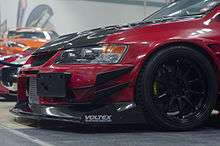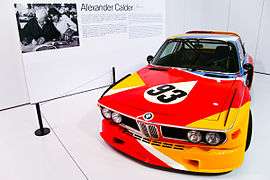Body kit
A body kit or bodykit is a set of modified body parts or additional components that install on a stock car. Typically composed of front and rear bumpers, side skirts, spoilers, bonnets (bonnet scoop), and sometimes front and rear side guards and roof scoops. There are many companies that offer alternatives to the original factory appearance of the vehicle. Body kit components are designed to complement each other and work together as a complete design. Despite this, the 'mix and match' approach is often seen on cars, where the front of one body kit will be matched with the rear of another, for example.

Automotive body kits are usually constructed of either fiberglass, polyurethane, or in some cases carbon fiber. Fiberglass is cheap and widely available, although it can crack upon impact. Polyurethane is popular because it is flexible and thus more resistant to damage. Carbon fiber body kits are rare, due to the cost of the materials, and are rarely seen on street-legal vehicles.
Factory-fitted body kits are now becoming more common, perhaps in response to the growth of the aftermarket tuning industry in the late 1990s and onwards. Many manufacturers now work in-house with their motor sport divisions to develop styling upgrades. Well known body kit brands include Veilside, Mansory, Novitec Group, Hamann Motorsport, Liberty Walk and Rocket Bunny.
Body kit history
The roots of the modern body kits go the beginning of the first part of the 20th century. With growing popularity of custom cars in America many car enthusiasts were looking to alter the appearance of their vehicles in order to improve the performance characteristics or make a car look different from the others (styling statement). Motorsport engineering also influenced the development of vehicle's body modifications, because certain changes in the construction of stock body parts allowed to achieve better results in terms of performance. Bumpers with bigger air dams and hood scoops deliver more fresh air to the engine which results in better performance output and heat reduction. Wide fenders or bolt-on flares allow to clear wider wheels. Trunk spoilers, bumper lips and bumper splitters reduce or properly distribute the down force which improves the overall air dynamics of a vehicle.[1] Body kits are used on cars, SUV and trucks.

Common body kit components
- Front and rear bumper (car)
- Side skirts (rockers)
- Bumper lips
- Bumper canards
- Bumper diffusers
- Bumper splitters
- Bumper grilles
- Fenders with vents
- Fender flares
- Widebody fenders and quarterpanels
- Spoilers
- Custom hoods
- Hood Scoops
- Roof scoops
- Side scoops
- Window louvers
- One piece front end
- One piece rear end
Popular culture
In video games like Need for Speed: Underground (2003) and beyond, Tokyo Xtreme Racer 3 (2003), Grand Theft Auto: San Andreas (2004), Midnight Club 3: Dub Edition (2005) Ridge Racer 7 (2006), Juiced series (2005), The Fast And The Furious (2006), MotorStorm: Arctic Edge (2009), Need for Speed: No Limits (Smartphone, 2015) and the Forza series etc., the vehicles can be modified in many ways, including with body kits.
An Infiniti G35 upgraded with a Vaydor body kit appeared in the 2016 Batman movie Suicide Squad.
See also
- Car tuning
- Hot rod
- Stance (vehicle)
- Veilside
- Import scene
- SEMA
- Custom car
- Aftermarket (automotive)
- Downforce
- Bumper (car)
- Spoiler (car)
- Kit car
- Pimp My Ride, a television series about vehicle restoration and modification that uses body kits extensively